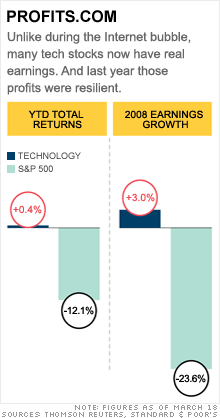The curious case of tech stocks
This economically sensitive sector is up in a down market. Can the good times last?
 |
| Pat Dorsey is the director of equity research for Morningstar. |

(Money Magazine) -- Technology shares are often thought of as volatile investments whose fortunes are subject to the whims of economic cycles. Yet through mid-March, when the Standard & Poor's 500 index was down 12% year to date, tech shares were slightly up. What's going on?
For one thing, tech firms tend to carry modest amounts of debt, which means the credit crunch has posed little danger to the sector as a whole. That helps explain why tech profits rose slightly last year when overall corporate earnings were down (see the chart).
Can the sector keep it up? I'm not convinced. Large software companies, for instance, are likely to be hurt by corporate America's reluctance to lay out cash for big-ticket upgrades in such an uncertain economy. But this is not a monolithic sector. There are plenty of firms with strong competitive advantages - or economic moats, as I like to call them - that should be able to withstand the slowdown. Here are two of my favorites.
CISCO SYSTEMS
It's hard to overstate the degree to which Cisco dominates the data-networking industry. The company controls two-thirds of the market for Ethernet switches, devices that companies use as traffic cops in their computer networks. Cisco (CSCO, Fortune 500) also owns half the market for routers, used by telecoms to move data across long distances.
The company has also been using its heft to move into newer markets - such as security, videoconferencing, and even home networking - where revenue has grown an average of 34% a year for the past three years.
True, Cisco will never see the blistering growth of the late 1990s. But I think the company's competitive advantages are strong enough to navigate this downturn. Despite the bleak outlook for tech spending, for example, Cisco could still see average annual revenue growth of 8.5% for the next five years.
Add to that the fact that its shares are cheap. How do I know? One way I can tell is by looking at the Cisco's free cash flow, a measure of profits that represents all the cash flow left over after the company meets its obligations and makes investments. Last year Cisco generated over $10 billion in free cash flow. Since the company could be valued - after subtracting the cash on its balance sheet - at around $67 billion, that's like earning a 15% profit yield.
EMC
This could be a challenging year for the network storage and security giant, as global infotech spending is expected to fall. But I expect EMC (EMC, Fortune 500) to hold up better than the broader IT market.
Why? While firms can defer software upgrades that will make them marginally more efficient, they can't function without firewalls and places to store vital data. That helps explain how EMC's infrastructure group managed to post 10% revenue growth in last year's soft economy.
EMC's market dominance and strong balance sheet - it has more than $6 billion in cash - should also allow it to ride out the downturn in better shape than smaller peers.
Pat Dorsey is the director of equity research for Morningstar. ![]()


